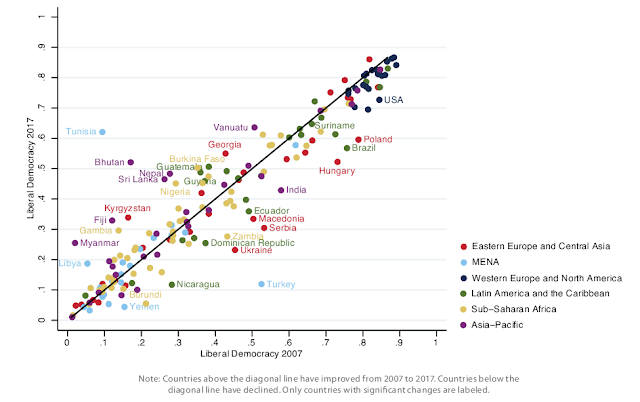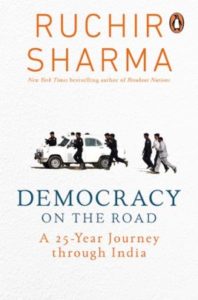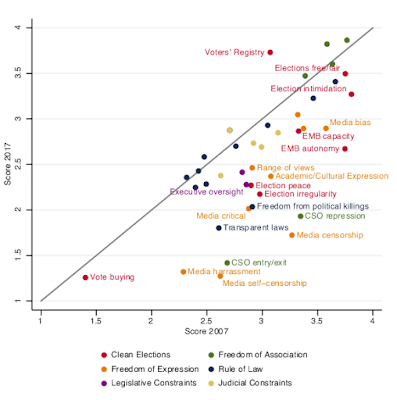Recent events in India have provided good reasons to worry for those who admire the country’s secular political traditions and cherish its democratic freedoms, the FT’s Victor Mallet writes in a review of Democracy on the Road: A 25-Year Journey Through India, by Ruchir Sharma:
When candidate Modi leans towards strident nationalism and Hindu fundamentalism rather than economic development, as he has in his recent campaigning, Sharma notices some alarming similarities between the Indian prime minister and the elected authoritarians Recep Tayyip Erdogan in Turkey and Vladimir Putin in Russia…. [His] group’s meetings with Modi and his right-hand man Amit Shah on various campaign trails are among the most unpleasant and confrontational in the book, because the BJP leaders distrust the liberal media and resent any mention of the massacre of Muslims in Gujarat in 2002, when Modi was chief minister of the state in western India.
 Even as India goes to polls, a recent Varieties of Democracy (V-Dem) report (above and below) has raised the alarm that “freedom of expression, media, and civil society are under threat” in key countries, such as India, analyst Rajiv Shah writes.
Even as India goes to polls, a recent Varieties of Democracy (V-Dem) report (above and below) has raised the alarm that “freedom of expression, media, and civil society are under threat” in key countries, such as India, analyst Rajiv Shah writes.
Yet Sharma is resolutely optimistic about democracy in India as a political system because the country’s energy and unpredictability has so far kept it free of enduring dictatorship, adds Mallet, a former Delhi bureau chief for the FT and author of ‘River of Life, River of Death: The Ganges and India’s Future’:
 Indian democracy is certainly like no other in terms of scale and complexity. This is a country of 1.4bn people — three times the population of Europe; more than four times that of the US — with multiple languages, cultures, religions, social strata and caste distinctions that give special significance to the notion that all politics is local.
Indian democracy is certainly like no other in terms of scale and complexity. This is a country of 1.4bn people — three times the population of Europe; more than four times that of the US — with multiple languages, cultures, religions, social strata and caste distinctions that give special significance to the notion that all politics is local.
“This is how it works in the real India, good politics so often has nothing to do with good economics, and much to do with raw emotion and old loyalties,” concludes Sharma.
The month-long process of Indian elections begins this Thursday, the Atlantic Council’s DFRLab adds:
The country is not only the most populous democracy in the world, but the way that people connect with each other and consume information is as diverse as the country itself. The push by parties to turn out voters includes an effort to dominate the ways in which people communicate, even if it includes disinformation, misinformation, or manipulation by other means…..Social media is already a major battleground in India’s pre-election fervor. The BJP has long been accused of running deceptive social-media accounts and disinformation campaigns from inside its so-called “IT cells.” The INC is reported to have followed suit, although the latter operation is allegedly suffering from internal disputes. READ More →
Other observers are less sanguine than Sharma.

dfrlab
India’s future as a liberal democracy appears to be at some risk, argues Sumit Ganguly. In the world’s largest democracy, liberalism is in retreat, as evidenced by a pattern of assaults on minorities, press freedom, and the independence of key cultural and intellectual institutions, he writes in India Under Modi: Threats to Pluralism, an article for the National Endowment for Democracy’s Journal of Democracy [see the new JOD website here].








